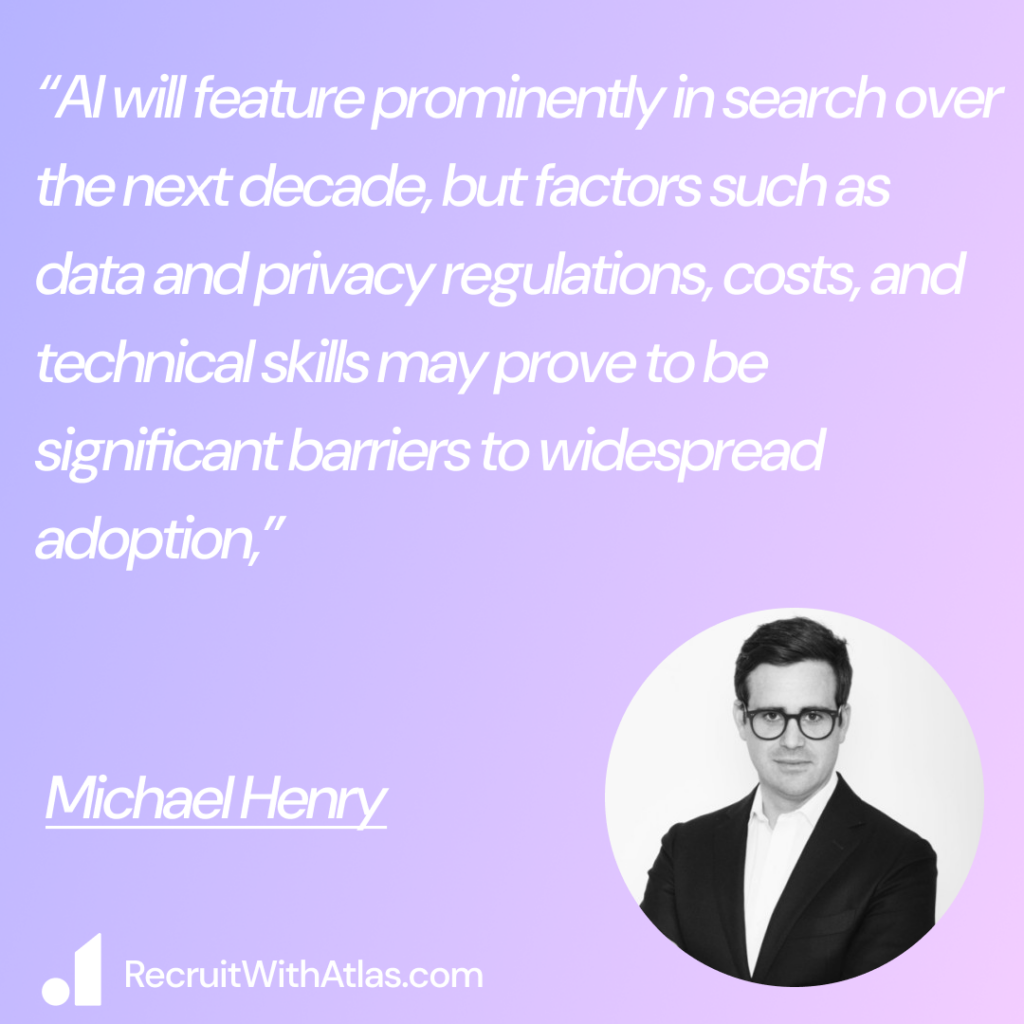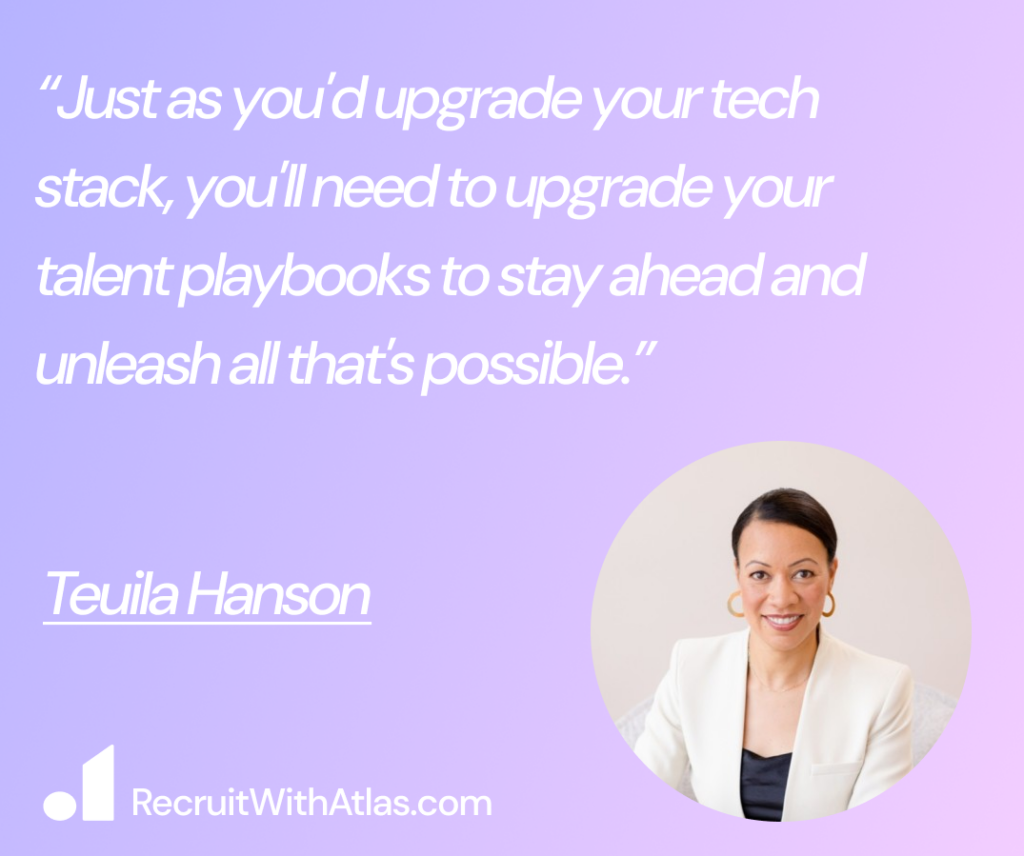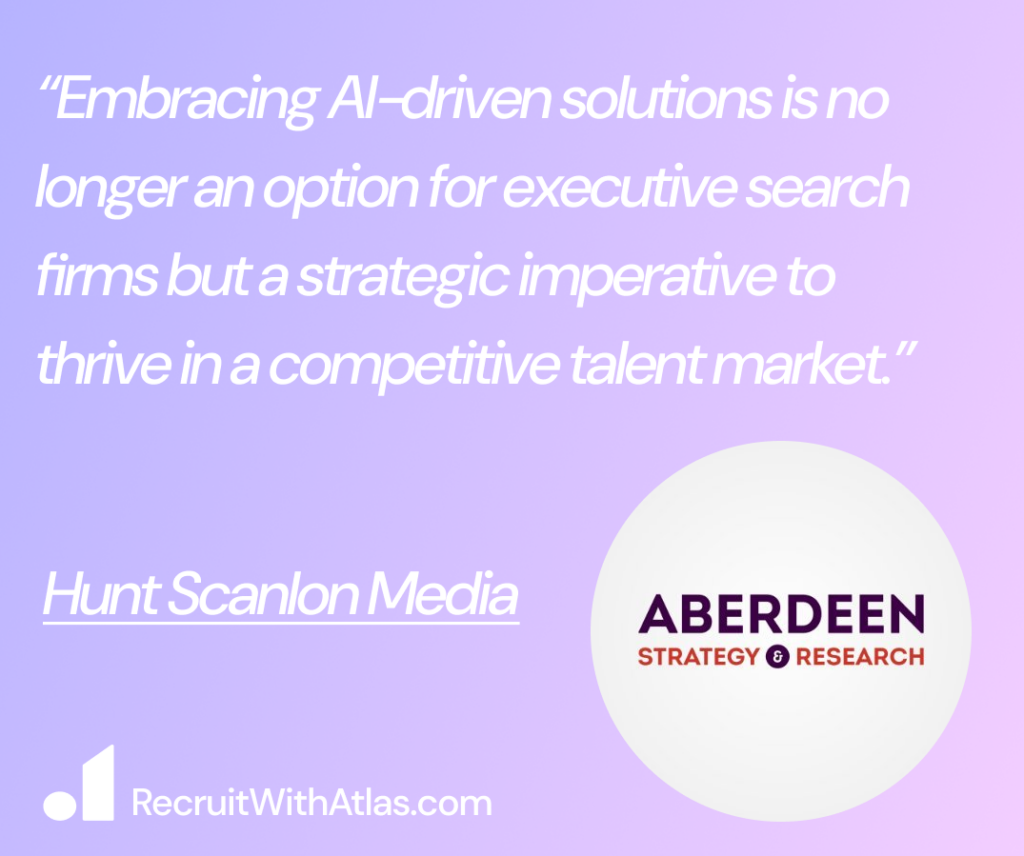
// Recruitment Strategies, Recruitment Technology, Executive Search Best Practices
Starting a Recruitment Agency? Buckle Up for a Tough Gig
29/10/2024
9 MIN
Starting a recruitment agency can be rewarding yet demanding. Those brave enough to enter the market must navigate challenges like establishing a unique brand, managing cash flow, and adopting AI technology to succeed.
But it isn’t as complicated as it seems. If you’ve successfully navigated recruitment’s intricacies, applying that same proactive mindset will guide you in launching your business
While the process may be easier than people suggest, it can also be unexpectedly challenging. Think of it like working out. The steps sound simple – just do your bicep curls and eat healthily. But sticking to it and following through is where it gets tricky, as you’ll need to manage emotions and deal with others’ opinions.
Helpful online resources are available to get you started on the basics, like opening a business, building a website, or choosing a recruitment platform, simplifying many steps in launching your agency.
But financial pressures and billing delays can complicate matters. Often, it’s psychological hurdles and time constraints that distract you from revenue generating activities.
Let’s take a closer look at some of these key challenges and the proactive steps you can take to tackle these issues head-on.
Navigating Challenges – From Groundwork to Growth
Your initial successes in launching a recruitment agency can quickly lead to new pressures, including financial planning, client relationships, and strategic partnerships. To ensure you can sustain these early wins, addressing these areas with a clear plan is essential.
Here, you’ll find critical challenges you may face along with preparation strategies to help you bridge those early wins into lasting success
Maintaining Momentum After Initial Wins
The initial thrill of starting up – shared LinkedIn posts, congratulations, and the rush of fresh deals – can quickly wear off.
As XRecruiter founders Declan and Blake share on The Recruitment Mentors Podcast, it’s easy for that dopamine to dip, leading to the classic “post-launch slump” if proactive steps aren’t taken.
One of the top takeaways for new recruitment business owners is this – early success can be both motivating and misleading. As Declan observed, “The excitement of starting up is electric… but when a deal falls through, or you’re waiting 60 days on unpaid invoices, that initial rush fades.”
It’s essential to approach early wins as just the start, not the end game. Keeping the “foot on the gas” and showing up day after day, even when excitement wanes, is what leads to sustainable growth.
Pro Tip: Don’t let early success become a stopping point – treat it as fuel for the journey ahead. Set realistic goals and build routines that keep your momentum strong beyond the initial wins. Consistency is what turns early victories into long-term growth.
The Cash Flow Challenge – Financial Readiness for Lean Months
In executive search, managing finances to prepare for leaner months is critical – a lesson that often comes too late for some agencies.
One of the key insights shared by Mike Richards on Mark Whitby’s The Resilient Recruiter Podcast about “recession-proofing your recruitment business” was the importance of maintaining a strong cash reserve.
This financial cushion helps ensure stability during challenging times and allows businesses to navigate economic fluctuations more effectively.
Cash flow issues, even in a profitable business, can bring down an agency if there isn’t enough cash on hand when it’s needed most.
Here’s the reality, businesses go under not because they’re unprofitable, but because they run out of accessible cash. And that can happen surprisingly quickly if there isn’t a plan to control spending when things are going well.
One essential rule for financial readiness is reducing “days sales outstanding” (DSO) – the average time it takes for clients to pay. Some agency owners might be reluctant to push too hard on overdue invoices, fearing it could damage client relationships.
As Mike points out, a client who drags out payments to 60 or 90 days isn’t an ideal partner to begin with. In his view, consistent cash flow management and clear expectations with clients can safeguard your agency, ensuring you’re not left in a pinch waiting on overdue invoices during challenging months.
Pro-tip – Ensure your revenue stream can support your agency for several months without income, as client payment cycles can vary. Set a realistic budget and personal financial targets to mitigate stress and support long-term planning.
Avoid the Headcount Trap – Prioritising Quality Over Quantity
When launching a recruitment agency, it’s tempting to measure success by team size, assuming more hires mean more business impact.
However, rapid expansion can lead to chaos. Blake reflects on a common early pitfall he faced when starting his business: he initially equated growth and success with the number of employees. Eager to build momentum, he hired around 10 to 12 recruiters in the first six months and felt he was on the fast track to success.
But as the excitement of a full roster wore off, reality set in. The office space became chaotic, and despite the growing headcount, profitability lagged, and stress levels soared.
This forced him to confront the harsh truth that more employees don’t necessarily mean a stronger business. Blake had to set aside these “ego metrics” and reevaluate the foundation of his company. He scaled back, shifted focus to quality over quantity, and reinforced a core principle: doing great work as individuals before chasing expansion.
This lesson became part of the company’s culture and training, guiding new team members to avoid similar pitfalls. As he says, running a business comes with unexpected mistakes – ones that rarely cross your mind at the start but have a profound impact on long-term growth and sustainability.
Pro Tip – Start by mastering your core processes and hiring selectively. A smaller, high-performing team will serve your clients better and position your agency for stable, sustainable growth.
Tackling Challenges – Building a Recruitment Agency the Right Way
Launching a recruitment agency brings big rewards, but also specific challenges. Establishing a clear market position is key to building a solid reputation and client trust.
Compliance can be complex – keeping up with ever-changing laws around hiring practices and data is essential. Financial stability can be a common pitfall, so ensure revenue streams and funding plans are solid.
To truly succeed, build a dependable candidate database, and work on attracting and retaining top talent within your agency. While AI tools can streamline recruitment, don’t overlook the power of personal connection, blending tech with a human touch is what will set your agency apart.
Let’s dive into each of these areas and explore specific actions you can take to tackle common challenges and set the stage for long term growth and success.
1. Establish a Strong Market Position
The recruitment industry is highly competitive, and new agencies often find it challenging to stand out among a multitude of options. Establishing a distinctive brand that effectively communicates the value of your recruitment services to both clients and candidates can be daunting, especially when larger, established agencies dominate the market.
What steps can you take to secure a strong market position?
- Identify your focus – Choose a specific industry, role type, or geographic area for your recruitment agency.
- Establish expertise – Specialising helps you become an expert in your chosen niche, making you more credible to clients.
- Understand client needs – A narrower focus allows for a deeper understanding of the unique needs and challenges faced by clients in that field.
- Build lasting relationships – With a clear niche, you can more easily cultivate strong, long-term relationships with clients.
- Stand out in the market – Differentiating your agency through specialisation enhances your visibility and competitiveness.
Many recruitment leaders stress the importance of client and candidate experience as a differentiator. This approach is effective across markets, where industry expertise and niche specialisation often result in faster placements and greater client loyalty.
2. Navigate Legal and Compliance Requirements
Recruitment is subject to strict legal requirements, particularly around data privacy, tax compliance, and employment law. For new recruitment agencies, navigating these regulations can be overwhelming, especially in a multi-market environment where different regions have distinct requirements.
What steps should you take to manage legal and compliance obligations effectively?
- Engage compliance experts – Collaborate with compliance specialists to navigate complex regulations and ensure your recruitment practices are aligned with legal standards.
- Choose compliant software – Evaluate and select recruitment software that integrate compliance features, particularly those that facilitate data collection and storage. This was you can efficiently manage and protect candidate data, enhancing trust with both clients and candidates
- Research regional regulations – Research the specific compliance requirements for your region, such as the CCPA in California and GDPR in the EU, to fully understand your obligations.
- Conduct regular audits – Regularly audit your recruitment processes and software to confirm adherence to these regulations and mitigate risks of non-compliance.
Despite initial concerns regarding data privacy regulations and the costs associated with maintaining secure systems, the use of AI recruitment tools is becoming essential.
Fortunately, many new recruitment platforms now come equipped with built-in security and compliance features, simplifying the adoption process.
This shift makes it easier for agencies to leverage AI while ensuring they meet necessary regulatory standards.

3. Manage Cash Flow and Financial Planning
Cash management is crucial for a recruitment agency’s stability, but the nature of the recruitment business means payments from clients can often be delayed. This unpredictability, combined with the need to pay staff and cover operational expenses, can create financial challenges for new agencies.
Recruitment leaders often recommend staying lean in the early stages, focusing on necessary investments like technology and compliance, which can have a substantial long-term impact.
How do you ensure financial stability through effective cash flow management?
- Develop a comprehensive financial plan – Create a detailed financial plan that outlines expected income, expenses, and funds flow fluctuations, allowing you to anticipate and prepare for lean months.
- Establish a realistic budget – Set a realistic budget that includes provisions for varying income levels and unexpected expenses to maintain operational continuity.
- Implement strict payment terms – Clearly define and communicate strict payment terms with clients to ensure timely payments and reduce outstanding invoices.
- Offer flexible payment options – Provide clients with a variety of payment options, such as credit card payments or payment plans, to encourage prompt payment.
- Explore invoice factoring – Consider invoice factoring or recruitment-specific financing to convert unpaid invoices into immediate cash, smoothing out cash flow during slower periods.
- Monitor income flow regularly – Regularly review your financial statements to identify trends and adjust your strategies accordingly, ensuring you stay ahead of potential issues.
- Build a cash reserve – Aim to build a cash reserve that can cover at least three to six months of operating expenses, giving you a financial cushion during downturns.
- Consult with financial advisors – Partner with financial advisors or accountants who specialise in recruitment agencies to receive tailored advice on managing your finances effectively.
- Plan for seasonal variability – Account for seasonal fluctuations in your recruitment business by analysing past performance and planning accordingly, ensuring you are financially prepared for slower periods.
- Invest in financial software – Use financial management software that can help track expenses, and revenue in real time, making it easier to stay informed and make adjustments as needed.
4. Build a Reliable Candidate Database
Sourcing quality candidates is a major hurdle for recruitment agencies. A reliable and relevant candidate database is essential, but building it from scratch can take time, especially when recruiting across regions like the US and the EU, where job market dynamics differ.
How do you improve the reliability of your candidate database and use AI tools?
- Identify target industries and roles – Clearly define the industries and specific roles you want to focus on to guide your sourcing efforts.
- Define candidate profiles – Establish clear profiles of ideal candidates based on skills, experience, and cultural fit to guide the AI algorithms in sourcing relevant candidates.
- Leverage existing networks – Tap into your existing professional networks, including former clients, candidates, and industry contacts, to identify potential candidates.
- Use advanced sourcing techniques – Implement advanced sourcing methods such as Boolean search, social media scouting, and leveraging niche job boards to discover passive candidates.
- Invest in recruitment technology – Consider investing in a recruitment management system that allows you to organise and manage candidate information effectively. Integrating an AI-powered recruitment platform can enhance and expedite sourcing. Modern AI systems can automatically scan and categorise candidates based on their skills, experience, and cultural fit, building a quality database faster than traditional methods.
- Engage in proactive outreach – Develop a proactive client and candidate outreach strategy to connect with potential candidates, using personalised outreach messaging to pique their interest.
- Implement data management best practices – Organise and maintain candidate data in a secure and compliant manner, ensuring easy access and retrieval when needed. For compliance in the US and EU, using AI systems that come with built-in GDPR and CCPA compliance allows you to collect and store data securely, critical for building trust in global markets.
- Use candidate feedback – Collect feedback from candidates about their experiences with your agency, using insights to improve your recruitment process and relationships.
- Track metrics for continuous improvement – Measure key performance indicators (KPIs) related to sourcing and engagement to identify areas for improvement and adapt strategies accordingly.
Tired of endless manual data entry and tagging?
With Atlas, managing candidate data becomes an effortless experience. Our AI technology guarantees data accuracy and takes care of the tedious tasks, making your database exponentially more efficient. Improve your candidate management efforts and deliver results like never before.
Try it out now!
5. Attract and Retain Skilled Professionals for Your Own Recruitment Agency
In executive search, your own team is your biggest asset. Attracting top talent to join your recruitment company can be challenging when competing with established firms offering larger benefit packages and extensive resources.
How can you attract and retain skilled talent in your recruitment agency?
- Promote growth potential – Clearly communicate the potential for career advancement within your agency, emphasising how employees can progress through different roles and responsibilities.
- Highlight training and development – Implement and showcase a comprehensive training program that includes mentorship, workshops, and online courses to enhance employee skills and knowledge.
- Emphasise entrepreneurial spirit – Foster an environment that encourages innovation and initiative by allowing employees to take ownership of their projects and contribute ideas for the agency’s direction.
- Create flexible work options – Offer flexible work arrangements, such as remote work or flexible hours, to attract candidates who value work-life balance and autonomy.
- Market your unique culture – Develop a strong employer brand by sharing testimonials and stories from current employees about the positive aspects of your work culture, including teamwork and collaboration.
- Offer competitive benefits – Even if your resources are limited, provide competitive benefits tailored to your team’s needs, such as health insurance, wellness programs, or performance bonuses.
- Foster a positive work environment – Encourage a supportive and inclusive atmosphere where employees feel valued and appreciated, which can lead to higher retention rates.
- Solicit employee feedback – Regularly ask for input from your team on how to improve workplace practices, demonstrating that their opinions matter and can influence agency policies.
- Invest in employee recognition – Implement recognition programs to celebrate achievements and milestones, reinforcing a sense of accomplishment and belonging within the agency.
- Engage in community building – Organise team-building activities, both in-person and virtual, to strengthen relationships among employees and create a sense of community within the agency.
6. Balance AI Recruitment Technology with the Human Touch
While AI technology is revolutionising recruitment, finding the right balance between automation and personal interaction is important. AI can automate many administrative tasks like resume screening, candidate sourcing, and interview scheduling, but an over reliance on these tools can create a transactional experience that fails to engage candidates and clients.
How can you maximise the use of AI in your recruitment agency?
- Differentiate between contingency and retained search – After selecting your business model, you must understand the various applications of AI.
AI is making strong inroads in contingency search, where the high volume and transactional focus make it ideal for process automation.
However, in retained executive search, success hinges on distinguishing candidates not just by qualifications, but by intangible qualities like leadership, communication, and cultural fit.
In this area, executive search consultants excel by evaluating these soft skills and aligning them with client cultures – a process that remains vital despite increasing automation. Brian Evans, practice director at Signium USA highlights that it’s this nuanced judgement and personalisation that sets consultants apart in a rapidly evolving, tech-driven industry.
Identify and automate routine tasks – Identify repetitive tasks within your agency that can be automated, such as finding candidates, note taking, scheduling interviews, outreach campaign management, and sending follow-up emails. This will help you reduce the time spent on administrative tasks.
Provide training on AI integration – Offer training sessions for your team on how to effectively use AI tools in their processes, highlighting the importance of balancing technology with personal engagement.

- Leverage analytics and advanced search features – Have your team learn how to use analytics and advanced search and filtering features to assess candidate suitability, and pinpoint candidates who are most likely to excel in specific positions by analyzing historical performance data.
- Use AI to uncover hard-to-find passive candidates – Many firms are already turning to AI to identify hard-to-find or passive candidates, predict candidate openness to opportunities, and streamline initial interview rounds.
Scott Jacobs, a partner at Acertitude, suggests that the next wave of AI will likely come through advanced support tools: imagine AI monitoring live interviews to suggest follow-up questions, scanning candidate backgrounds for reference recommendations, or drafting engagement emails to maintain candidate interest.
These tools won’t just populate a broad list of potential candidates – they’ll help refine the shortlist and improve the thoroughness of candidate selection, bringing a new level of insight to the process. - Prioritise human interaction – Emphasise the importance of maintaining human involvement in client and candidate facing situations to build trust and rapport, which are essential for successful placements.
- Combine AI insights with personal touch – Guide your team to use AI-generated insights to inform their interactions, personalising communication based on candidate profiles and client needs to enhance engagement.
- Monitor AI performance – Regularly review how well AI tools are enhancing your recruitment processes, and encourage your team to make adjustments as needed to improve outcomes.
- Gather feedback – Instruct your team to solicit feedback from both clients and candidates about their experiences with the AI and human elements of your recruitment process, using this data to refine your approach.
- Foster collaborative teams – Encourage collaboration between your recruiters and AI systems, ensuring that technology complements their skills rather than replaces them.
- Evaluate client satisfaction – Implement regular measurements of client satisfaction to determine how well the combination of AI and human interaction is meeting their expectations, and adjust strategies accordingly.
AI is transforming the executive search industry by enabling firms to leverage data-driven insights for smarter candidate sourcing and faster, more accurate decision-making.
Industry experts emphasise that adopting AI tools is important for firms to maintain a competitive edge in today’s executive search market.

FAQs for Recruitment Agency Owners
Q: Should I specialise in a specific industry from the start?
Specialising in a particular industry is often recommended, as it allows you to build expertise and credibility within that field. This approach is beneficial in markets like the EU, where industry-specific knowledge is highly valued. However, in the larger and more diverse market like the US, some agencies may initially operate more broadly before honing in on a niche.
Q: How much time should I allocate to business development?
A significant portion, especially early on – roughly 40-50% of your time—should focus on business development activities. Consistent outreach, client meetings, and networking will be essential in building your client base and establishing your agency’s presence in the market.
Q: How long does it typically take to make my first placement?
Placements depend on factors like niche recruiting, candidate pool, and client relationships. On average, new agencies see initial placements within 3 to 6 months. Building a pipeline early and maintaining steady outreach helps accelerate this timeline.
Q: Should I build a team right away or operate solo at first?
Starting solo can be cost-effective, allowing you to establish a client base before expanding. However, if you have the budget, consider hiring support for admin tasks or junior recruiters to help build your pipeline. Many agencies start small and scale based on demand and capital flow.
Q: Do I need recruitment software from day one?
While it’s possible to start without specialised software, an Applicant Tracking System (ATS) or recruitment platform is a wise investment, even for small agencies. It streamlines client and candidate management and makes compliance easier to handle across different markets. For agencies operating in multiple regions, consider platforms with features designed to meet varying compliance requirements.
The Road Ahead for Recruitment Agencies
Executive recruitment is not merely about filling high-level positions – it’s a journey that demands thoughtful planning, industry expertise, and a resilient spirit to tackle the inevitable challenges of the early stages. As you define your niche and diligently manage cash flow, the integration of AI recruitment tools can significantly enhance your agency’s growth potential in both local and global markets.
Declan and Blake’s experiences in establishing multiple executive search firms illustrate that the process may be less daunting than it seems. They emphasise that with the right mindset, starting a recruiting agency can be a more straightforward endeavour than many anticipate.
Moreover, striking a balance between technology and personal interaction is important in the executive search field. Successfully navigating this duality positions you to build a successful recruitment agency in a highly competitive landscape.
As you embark on this exciting journey, having a strategic roadmap will prove invaluable. Remember, executive search is fundamentally a relationship-driven business. By combining the right tools with genuine human engagement, you can distinguish your agency from the rest and lay the groundwork for lasting success.








